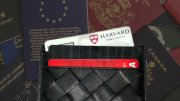Updated May 23, 12:15 PM
A federal judge in Boston has issued a temporary restraining order to prevent the government from revoking Harvard’s ability to host international students. A hearing on the matter is scheduled for Thursday, May 29.
Harvard’s authorization to host international students was revoked Thursday by U.S. Secretary for Homeland Security Kristi Noem. Harvard has filed a complaint in response, and a motion for a temporary restraining order will follow. If the government’s action stands, the move may prevent thousands of international students from graduating next week. Looking further ahead, it would affect the 2025-2026 academic year and prevent the University from enrolling international students who are legally in the United States under the Student Exchange and Visitor Program. Currently enrolled international students attending Harvard under that program will be forced to enroll at another U.S. institution or leave the country.
Harvard president Alan M. Garber wrote to members of the Harvard community this morning to “condemn this unlawful and unwarranted action...[that] imperils the futures of thousands of students and scholars across Harvard and serves as a warning to countless others at colleges and universities throughout the country who have come to America to pursue their education and fulfill their dreams.”
With her dramatic announcement, shared via a letter to the University and later on social media, Noem followed through on a threat she made in April as the Trump administration’s attacks on Harvard intensified.The Student and Exchange Visitor Program (SEVP), which manages foreign students and exchange visitors to the United States, is run by U.S. Immigration and Customs Enforcement (ICE), a division of the U.S. Department of Homeland Security.
On April 16, Noem had written to Harvard demanding that the University produce records of any “illegal and violent activities” by foreign students studying at Harvard on student visas. Failure to comply, she said, would result in loss of SEVP certification. Today’s suspension of Harvard’s certification followed “a back-and-forth in recent days” about the legality of that request, according to the New York Times.
But Garber wrote in his letter that the government’s claim that it took action based on Harvard’s failure to comply with requests for information is untrue. “In fact, Harvard did respond to the Department’s requests as required by law.” The complaint filed Friday morning states that Harvard provided records as initially requested by Noem on April 30, and then, in response to a further request from the government, provided additional documents on May 14. The move to revoke Harvard’s certification subsequently came without explanation or the citation of “any regulation with which Harvard failed to comply,” according to the complaint filed by the University.
Harvard spokesperson Jason Newton said, “The government’s action is unlawful. We are fully committed to maintaining Harvard’s ability to host international students and scholars, who hail from more than 140 countries and enrich the University—and this nation—immeasurably. We are working quickly to provide guidance and support to members of our community. This retaliatory action threatens serious harm to the Harvard community and our country, and undermines Harvard’s academic and research mission.”
There were 6,793 international students enrolled at Harvard during the 2024-2025 academic year, representing 27.3 percent of the student body. The tuition and other student charges they pay are an important source of income for the University. In fiscal year 2024, student-related income (such as tuition, room, and board fees, minus University-provided financial aid) was about $1.4 billion, representing approximately 21 percent of Harvard’s total operating revenue. International students typically pay closer to the full cost of a Harvard education than students from the United States.









